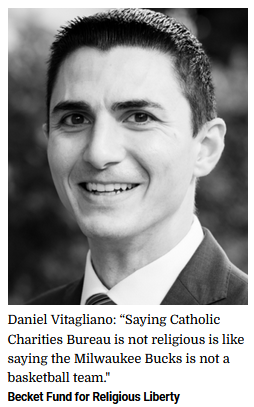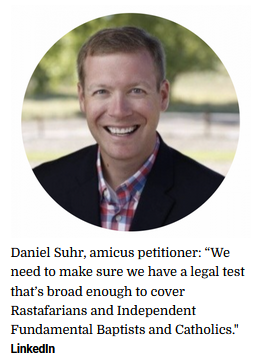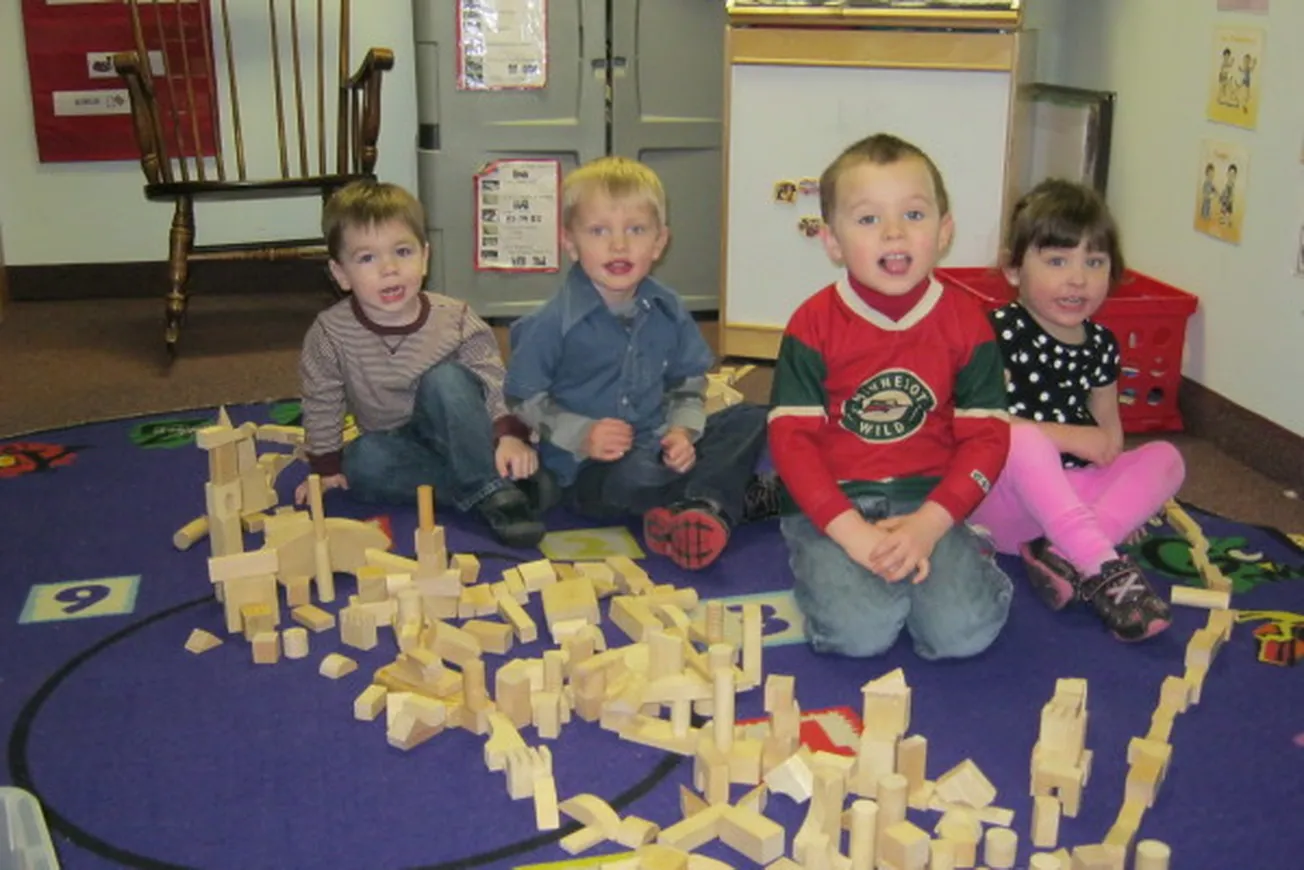By Maggie MacFarland Phillips, RealClearInvestigations | May 11, 2023
For over a century, the Catholic Charities Bureau of Superior, Wis., has aided people of all faiths: the developmentally disabled, seniors, and children, many of them low income. As Milwaukee Archbishop Jerome Listecki recently noted, since the time of Jesus Christ, the Church has had “a mandate from Scripture to serve the poor.”
The state of Wisconsin disagrees. Its labor division has ruled that the charity is not eligible for a religious exemption from contributing to the state’s unemployment insurance system, because it offers its services free of proselytizing, regardless of clients’ religious background. As a result, Wisconsin’s Labor and Industry Review Commission determined it was essentially a secular organization, not operated for “primarily religious purposes.”

Daniel Vitagliano: “Saying Catholic Charities Bureau is not religious is like saying the Milwaukee Bucks is not a basketball team."
Becket Fund for Religious Liberty
The charity’s appeal, which contends that the state is determining for itself which activities are and are not within the scope of religious obligation, looms as a possible watershed for religious liberty. Proceedings open May 18 before the Supreme Court of Wisconsin – before the August swearing-in of Justice-elect Janet Protasiewicz, a progressive who will give the court a 4-3 leftward tilt after a costly, high-profile election this spring to replace a conservative. A close watcher of the case said it seems likely that it will be heard in the fall term, after Protasiewicz is sworn in.
Daniel Vitagliano of the Becket Fund for Religious Liberty, representing the charity, said the state is presuming to interpret church canon and internal church policies, to determine for itself which services fall under the tenets of a religious faith. That’s an idea the Wisconsin Supreme Court previously rejected in a 1995 decision, Pritzlaff v. the Archdiocese of Milwaukee.
“Saying Catholic Charities Bureau is not religious is like saying the Milwaukee Bucks is not a basketball team,” said Vitagliano. “It’s as absurd as it sounds. The Wisconsin Supreme Court should intervene and correct the lower court’s error.”
Wisconsin is not the only government challenging religious groups, and those challenged don’t fall neatly on one side of the political spectrum. Texas is bearing down on groups it suspects may be aiding illegal border crossings. Similarly, four Republican members of Congress accuse Catholic Charities USA of supporting illegal border crossings, threatening an investigation. Catholic Charities USA denied the allegations, noting that the federal government determines who enters the country, and the charity’s humanitarian care (“food, clean clothes, bathing facilities, overnight respite”) is typically provided after migrants are processed and released.

Also stirring concern at the federal level is opposition to a rule proposed in January by the Biden Health and Human Services Department. According to two Notre Dame lawyers objecting in a Wall Street Journal op-ed, the rule “would require religious hospitals and doctors to perform deeply contested procedures – including abortion and ‘gender transition’ surgery – even though two federal appeals courts have rejected similar regulations on religious-liberty grounds.” The article also said “this proposal, and another, would also scale back conscience protections, pressuring healthcare providers to choose between their professional obligations and their faith.”
In each instance, concerns hinge on this question: To what extent can religious organizations manage their own personnel according to the dictates of their faith?
“This is not having a fire marshal come in and tell you how many people you can seat on a Sunday,” said Daniel Suhr, an attorney who filed an amicus brief with the Wisconsin Supreme Court in support of the Becket petition, on behalf of a coalition of Protestant educational institutions. “This is much more entangled than that.”
Since 1986, the Catholic Church in Wisconsin has provided its own unemployment insurance, the Church Unemployment Pay Program (CUPP), for lay employees of its institutions, such as schools and parishes. But the Catholic Charities Bureau is not covered and is paying into the state program. State agencies continued to deny a religious exemption to the Bureau and several of its sub-entities, even after a 2016 circuit court decision granted a religious exemption to one Bureau sub-entity that serves individuals with intellectual disabilities. The case has reached the state high court after a series of lower court reversals.

The Bureau says on its website that its mission is “[t]o carry on the redeeming work of our Lord by reflecting gospel values and the moral teaching of the Church,” and “[t]o collaborate with all people of goodwill to alleviate human suffering by sponsoring direct service programs for the poor, the disadvantaged, the disabled, the elderly and children with special needs.”
As part of this mission, Catholic Charities says it provided 632 units of “safe, affordable housing” across northern Wisconsin using 685 employees in 2022, which amounts to about 25% of its nearly $40 million operating budget. To deliver these and other services, Catholic Charities partners with secular providers, who must agree to comply with Catholic social teaching in carrying out their duties.
It is this collaboration with “all people of goodwill,” the circuit court says, that disqualifies Catholic Charities from the religious exemption, instead of requiring it to contribute to an account with Wisconsin’s unemployment reserve fund. Because Catholic Charities does not evangelize or catechize, conduct religious rituals or worship, or require its clients to participate in religious activities, the court said, Catholic Charities cannot be considered to be operating as a primarily religious organization, as state law requires for a religious exemption.
Becket lawyers argue that with the exemption, the church can run its program more cheaply, allowing it to devote more money to its programs. The Church Unemployment Pay Program says its maximum weekly benefit rate, $370 for eligible beneficiaries, is identical to the state program’s.
Mike Mosher, deputy communications director for the Wisconsin Department of Workforce Development, declined to comment directly on the Catholic Charities case. In an email to RealClearInvestigations, he wrote that his department “bears responsibility for ensuring everyone in the workforce is treated fairly and equitably.”
In its petition, Becket objects to the government usurping the authority of the Bishop of the Diocese of Superior, who controls the operation of CCB and its affiliates.
The circuit court decision, Vitagliano said, “will require Wisconsin executive branch officials and Wisconsin courts to undertake intrusive inquiries into the practices of many different admittedly religious groups and then decide whether specific activities carried out by these religious groups are ‘inherently’ or ‘primarily’ religious. That is the antithesis of church-state separation.”
U.S. Supreme Court decisions such as Our Lady of Guadalupe School v. Morrissey-Berru in 2020 barred governments from deciding whether or not employees’ duties were sufficiently religious to merit First Amendment protection in the hiring and firing of employees at religious schools. Involving state agencies in unemployment at religious organizations, Becket lawyers argue, opens up the church to government interference of the type ruled out by the Guadalupe decision, in determining what constitutes a true religious ministry.
“Catholic Charities Bureau helps the disabled, the elderly, and those living in poverty – regardless of their faith,” said a press statement from Becket Law. “This mandate to serve all those in need comes directly from Catholic Church teaching and advances the Catholic Church’s religious mission by carrying out the corporal works of mercy.”
According to Suhr, if the Wisconsin Supreme Court upholds the circuit court decision to deny Catholic Charities Bureau the religious exemption, it may threaten the operations of less hierarchical or independent faiths. He said, “We need to make sure we have a legal test that’s broad enough to cover Rastafarians and Independent Fundamental Baptists and Catholics.” A test that solves a problem for Catholic Charities may create problems for other denominations, he said.
Suhr makes a distinction between the Catholic Church and what he calls para-church ministries, affiliated with individual, independent congregations or congregational networks that lack strong overarching denominational affiliation at the state or national level. “Those entities still deserve the full protection of the First Amendment,” he said. “As churches and denominations evolve and people’s faith practice evolves, the protection of the First Amendment stays the same.”
“As denominations decline, we have these legacy institutions that have denominational backgrounds, but not necessarily, you know, the full, vibrant present-day faith that’s visible,” said Suhr. He points to universities, hospitals, and social services providers, “all these other places that get significant government contracts” in order to serve the public. But the institutional affiliations remain. “Are we going to have a bureaucrat make a judgment call about how religious is enough?”
Original article link






